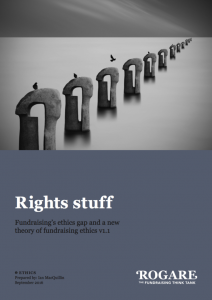In the early 1990s, Harvard professor Mary Ann Glendon penned a seminal work entitled Rights Talk: The Impoverishment of Political Discourse. In it, she argues that we emphasize an ever-expanding catalogue of rights to the exclusion of duties and responsibilities. When each side of a debate can appeal to an inalienable right, ngridnderstanding, compromise, and civic life are impeded.
Sadly, the fundraising profession lacks the lexicon to express the moral and normative concepts that undergird the motivations of donors and the needs of beneficiaries. While Glendon calls for the inclusion of the “missing language of responsibility”, I believe it is essential that fundraisers discuss the missing language of the rights and duties of donors, beneficiaries, and the fundraiser. Without it, we are doomed to act in ways that undermine our own profession and most importantly the important work of philanthropy.
What is a right and what does that mean?
Put simply, a right is a just claim on another. In common parlance, we often talk about rights as synonymous with something we are owed, something we are due, or something we are permitted to do without interference.
To say that Sally has ‘freedom’ is a meaningless sentence unless Sally can enforce that claim on others as if to say: “You may not interfere with my freedom!”
 Mary Ann Glendon
Mary Ann Glendon
Here is the challenge that Glendon outlines:
By arguing that we have a claim against another, we rarely talk about our own responsibilities and duties or those of others and how they are prioritized.
In essence, any time we talk about a right, we are pitting everyone else around us against that claim. Sally’s right to freedom constructs a duty on all of us to leave her alone. This is a negative, or non-interference, duty that applies to all of us. Conversely, if Sally can legitimately claim a right to a basic education, that statement is meaningless unless some agent has a duty to provide Sally with said education. This is a positive duty, the obligation of a specific agent to provide something.
Negative rights are inherently easier but universal. If we do nothing, we are probably fulfilling our duty and respecting the rights of others. But that means making a claim against literally everyone on the planet. Positive rights are harder and specific to an agent. Someone is required to act, to provide, to help. In some cases, it may require a series of actions.
“Fundraisers occupy a specific role in a morally necessary (and good) institution, which generates specific rights and duties that are different from other professions.”
Role Rights are also closely connected to a person’s role in society. The roles that we voluntarily take on or are required to take on contextualize the rights and duties we have and how we ethically discharge those duties. For example, if I were to take a third of my neighbor’s paycheck and lock him in my basement if he refused to hand it over, I would be completely wrong. The tax collector and the police, however, have different roles and therefore different rights and duties. While it would be wrong for me (stealing and kidnapping); it would be not only right for them conduct the very same actions but also wrong for them to fail to discharge those duties.
Oxford professors Henry Shue and David Rodin explain in their book on the moral status of the military (see p126) that according to the idea of ‘role morality’, roles of the likes of lawyer, physician, journalist, clergyperson, and soldier carry “special rights and obligations attach to certain social roles, and these differ from the rights and obligations of ‘common morality’ governing the behavior of people not inhabiting such roles”.
Lawyers, for instance “are thought to have the right (or even the duty) of zealous advocacy, even if that means brutally cross-examining innocent witnesses for the other side; journalists are thought to have the duty of confidentiality, even if their refusal to divulge sources results in harm.”
They further say:
“The rights and obligations of a particular role are justified when the institution they serve is a morally good one – or at least a morally necessary one – and these rights and obligations are essential to fulfilling the role. For example, zealous advocacy among lawyers is justified because the institution they serve, the adversary system, works to ensure justice.”
It is my argument that fundraisers occupy a specific role in a morally necessary (and good) institution, which generates specific rights and duties that are different from other professions.
 Soldiers, fundraisers, and lawyers all have different professional ethics that are based on their specific roles.
Soldiers, fundraisers, and lawyers all have different professional ethics that are based on their specific roles.
What rights are essential and what are the corresponding duties?
The fundraising profession generally accepts the need for codes – such as the Association of Fundraising Professionals’ Donor Bill of Rights – that embody series of rights that we believe are essential for donors to possess.
To our fault as a profession, there is a dearth of related sets of duties of a fundraiser that are codified as positive obligations of the role. The closest we have are a thoughtful piece by Simone Joyaux on the role of the fundraiser, and new work on fundraising ethics by Rogare. Most other professions have a set of literature that describes the duties and ethical responsibilities of the professional. This failing in part explains why regulation of our industry often falls prey to heavy handed and ill-informed legal penalties.
Such regulation need not be created in vacuum, devoid of context however. The support of other professions and a deeper understanding of the rights and duties at play can enlighten both those inside and outside philanthropic circles.
Corresponding duties to donors
The natural corollary of a donor’s right to be informed of the organization’s mission (Right I in the Donor Bill of Rights) is a duty on the part of the fundraiser to inform the donor. This is a positive duty required by the donor’s right. The rights cannot exist – are in fact meaningless – unless the fundraiser fulfills their various duties to the donor. If a donor has the right to receive acknowledgement, a fundraiser has shirked a duty if they fail to provide it.
Therefore, once a person becomes a donor to an organization, they are possessors of rights that are claims against the fundraiser. The fundraiser is duty-bound to positively fulfill those rights claims because they are the appointed role-bearer that sits between the donor, the beneficiary, and employed by the charity for that purpose.
This duty need not be exclusive to someone named as a fundraiser but my contention is that anyone who fulfills these specific duties is doing them in the name of philanthropy. By informing a donor, acknowledging them, or protecting their interests, the agent does so on behalf of a philanthropic interest.
But what about potential donors and non-donors?
Do non-donors and potential donors have rights claims against fundraisers? I argue that fundraisers have positive and negative duties towards both that derive from their roles and the entities they serve.
Fundraisers have a negative duty not to interfere with non-donor privacy. I can just imagine my fundraising colleagues agog at reading that sentence and I may lose my credibility for uttering it. But it’s true. Before I get excoriated, let me clarify: there are three types of people in the role of the fundraiser:
- donor
- potential donor
- non-donor.
The non-donor is someone who has explicitly said no to involvement with the non-profit organization. They do not wish to support it and have communicated their wishes. That declaration is sacrosanct and it is a violation of the fundraiser’s duty to the non-donor to pursue them.
However, until someone says that they do not wish to be a donor, they can be classified as a potential donor. This is the moral origin of the fundraiser’s right to ask.
Potential donors are moral agents with duties of care to beneficence that originate from their shared common humanity within their social context. For Immanuel Kant, the duty of care derives from consistency with the principle that people who regard themselves as ends (and not merely as means) would also regard all others and ends in themselves. The utilitarian would also argue that a duty to care for others is based on interdependence and the greater good that results from supporting others.
 Rogare’s new theory of fundraising ethics aims to balance donor and beneficiary rights
Rogare’s new theory of fundraising ethics aims to balance donor and beneficiary rights
Unlike marketers who are selling a product, fundraisers are making potential donors aware of causes that concern them and people they themselves care about. They are advocates for a morally necessary or morally good institution that has a direct effect on the life of the potential donor.
The challenge in nearly every sector of the debate is that rights are viewed as sacrosanct, especially negative rights. The right of freedom and privacy are never to be abridged even before refusal occurs. The stark reality is that rights come into conflict often and require constant balancing – which is at the heart of the new theory of ethics for fundraising that Rogare is developing.
This balancing act is undertaken by individuals who weigh their own duties and rights, but commonly are also weighed by governments who assess the relative merits of their duties and obligations against the rights of their citizens. For example, the right of personal property is infringed upon daily as I am taxed for goods I buy and income I receive in order to enable the government to fulfill its positive duty to me and my fellow citizens in the form of roads, police, and schools.
Likewise in the US, the Supreme Court has ruled that door-to-door canvassing is constitutionally protected free speech. Justice Black writes in his concurrence:
 “Freedom to distribute information to every citizen wherever he desires to receive it is so clearly vital to the preservation of a free society that, putting aside reasonable police and health regulations of time and manner of distribution, it must be fully preserved. The dangers of distribution can so easily be controlled by traditional legal methods, leaving to each householder the full right to decide whether he will receive strangers as visitors, that stringent prohibition can serve no purpose but that forbidden by the Constitution, the naked restriction of the dissemination of ideas.”
“Freedom to distribute information to every citizen wherever he desires to receive it is so clearly vital to the preservation of a free society that, putting aside reasonable police and health regulations of time and manner of distribution, it must be fully preserved. The dangers of distribution can so easily be controlled by traditional legal methods, leaving to each householder the full right to decide whether he will receive strangers as visitors, that stringent prohibition can serve no purpose but that forbidden by the Constitution, the naked restriction of the dissemination of ideas.”
Why would this be the case when it intrudes on my personal space? Because in a democratic society, citizen action to promote the common good including and especially giving gifts to organizations that are necessary for the protection and promotion of that good is a higher priority than convenience non-interference claims of individuals.
The argument that individuals should never be asked violates the core belief that underpins communal living. It is impossible to live amongst others and not tie our current and future state to the relationships that we have with them. The equal worth and dignity of our fellow humans requires that we balance our non-interference claims with their claims for assistance.
A fundraiser, as an advocate for the beneficiary claiming assistance, informs the donor of the opportunity to assist the claimant through their philanthropy. Like lawyers, zealous advocacy is the duty of the fundraiser. While ethical rules of conduct should apply to lawyers and fundraisers alike, those rules would never prohibit the agent from fulfilling their duty. Could a lawyer do their job if they were prohibited from probative examination of innocent witnesses?
“The argument that individuals should never be asked violates the core belief that underpins communal living. It is impossible to live amongst others and not tie our current and future state to the relationships that we have with them.”
Again, it’s not possible for any individual to positively respond to each of the institutions that present worthy causes to support. As such, individuals have an inviolable right to refuse to be a donor to a specific cause, which constructs a non-interference duty on the part of fundraisers for that cause to respect that zone of inviolability.
This is why laws protect individuals from ongoing solicitation once their request to be removed has been received and why the US Supreme Court argued that laws against criminal trespass would protect citizens from solicitation after they have said no. Failure of the charity to self-enforce this is a violation of their duty and deserves greater punishment from external entities.
This philosophical underpinning thus constructs a duty to ask derived from the duty to the donor and the duty to the beneficiary. To be clear, this is often a specious distinction. Often beneficiaries are also donors in a literal or figurative way: donors are beneficiaries when they support the common good, which includes themselves; donors are beneficiaries when they support causes that are altruistic because they benefit their own interests.
Duty to the donor
In nearly all other cases in society, we believe that public trust requires transparent and proactive information regarding threats to my person, my family, and my community. I am owed, I am due, it is my right to know whether I am in danger or at-risk of harm. What constitutes harm varies in risk and magnitude. Every cause is a threat or actual harm that is occurring in your community.
Whether you define your community as your neighborhood or a global commons, it is your right to be informed of problems that may impact your life and the lives of the people you care about. Intuitively, we agree that imminent, material issues such as contamination of our water supply or the outbreak of a disease are grave risks. As individuals, we assess those risks and our responses based on the information presented to us and our personal values. Some people will respond more to environmental risk than to animal cruelty risks. Some will respond more to threats to education than threats to the arts. Our personal values assign priority to those risks.
The duty of the fundraiser is to the donor to inform them of the risk or threat to the common good that can be prevented through their voluntary action. This duty derives from the potential donor’s right to know.
Duty to the beneficiary
Fundraisers do not exist outside of a specific organization. Even consultants that work for various organizations are tied to those specific causes. Put another way, I’m never fundraising for the general common good. I am always fundraising for a specific element of the common good, a specific cause.
For every fundraiser, there is a discrete set of beneficiaries for whom the fundraiser advocates. The beneficiary cannot, for various logistical reasons, inform and petition others for support so they appoint an advocate to perform that duty. Without the fundraiser, the threat to the common good would persist unmitigated. Their personal need would continue. As such, their rights (constructed by the specific threat) require a duty on the part of the fundraiser to ask. Failure to discharge this duty violates the trust placed in the fundraiser to act on their behalf.
The duty to care for the beneficiary is the same principled duty that a lawyer has to her client or a physician has to her patient.
Summary
This article lays the groundwork for a philosophical rationale for a fundraisers duty to ask. This duty derives from two rights:
- A current donor has specific and codified positive rights that a fundraiser is designated to fulfill. The fundraiser shirks a specific duty when they fail to provide donors with information and to ask for support on behalf of beneficiaries.
- A potential donor has a positive right to information regarding threats to the common good that may primarily be fulfilled through a fundraiser’s duty to ask for support on behalf of beneficiaries.
Negative, non-interference rights are important and must be respected. However, they are not sacrosanct and the appropriate balancing of the fundraiser’s right to ask with their duty to donors and beneficiaries must respect all parties’ claims. In a later blog, I’ll look at some hard cases of balancing the rights and duties of beneficiaries, fundraisers, and donors.
We are social creatures with a duty to care for one another and our shared experience. The love of other humans, the root of philanthropy, is to make one another aware of threats to that shared experience. Fundraisers have distinct roles in society of making those threats known and galvanizing voluntary action for the common good.


